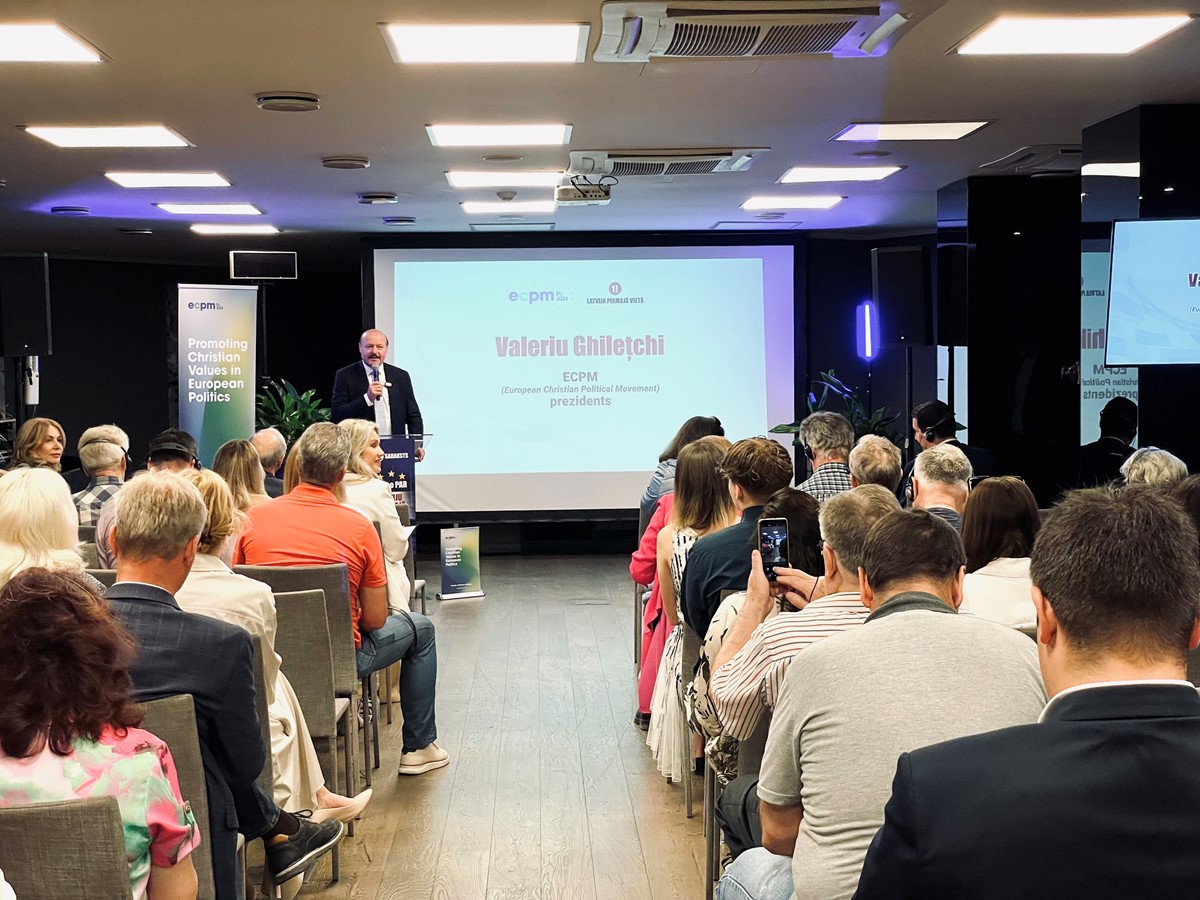
Friday, May 24, 2024
Returning to the Roots of Europe
Together with our member party, Latvia First (Latvija Pirmajā Vietā), we organized a seminar in Riga on the importance of Christian values in the European story.
ECPM President, Valeriu Ghilețchi, started off the seminar by welcoming everyone and by introducing them to ECPM, our work, our MEPs and our values. He explained that the reason for our party's existence is to remind people that Christian values like love, freedom, justice, peace and solidarity promoted by Jesus in his time are also the foundation of our current society and modern systems of law, education, economics and politics. Ghilețchi then focused his attention on one of the ECPM spearheads, namely our work on promoting family-friendly policies. He emphasized the importance of healthy families, and of pro-life, pro-family policies, which create the environment for people to balance work and family life successfully, where institutions strike a balance between the interests of children and that of parents and comes to their rescue when struggling financially.
The second speaker, Jeff Fountain, took the audience through the entire history of European civilization and successfully pointed out how Christian thought and ethic is at the root of many of the systems and concepts we take for granted today. He pointed to the fact that this year, on May 9th there were three celebrations which coincided: Europe Day, the end of the WWII, and Ascension Day. There would not be a Europe Day without Ascension Day and the Great Commission. It was due to the work and faith of the early Christians and Church Fathers that faith had spread all over Europe in the first century. Europe Day is a long-term fruit of the missionary movement, he argued. Then, he continued to show how monasteries are the building blocks of the new order that was being shaped in Europe: they were centers for art, music, law study and commerce. Till this day, the largest and best schools and universities in Europe are connected to, or have their origins in, a monastery or a church. Despite the dark chapters of Christianity, Europe's identity, culture, and values are shaped by the story of Jesus and the Bible.
The Schuman Declaration on May 9, 1950 was a 3-minute speech which laid the foundations to the European house where 450 million people would live in peace and collaboration. Schuman had a deep personal faith which inspired his political thinking. Advised by a friend who told him that the next generation of missionaries will be "saints in suits", he pursued a career in law and politics. He served as prime-minister of France before WWII and was arrested when the Germans invaded Paris. He believed that "love your neighbour" was a democratic principle which, applied to nations, meant serving and loving neighbouring peoples. Similarly, Konrad Adenauer, a close friend of Schuman's and the chancellor of Germany at the time, was also a man of faith and equally believed that reconstruction and friendship were going to be vital for the reconstruction of Europe. Never before had a defeated nation in war been invited at post-war discussions as an equal, but because of it, Germany is a leading force in Europe (and the world) today and has an unbreakable bond with France and the United Kingdom.
The third speaker was Vladimir Gjorchev, member of Parliament from North Macedonia, and an expert on demography trends in Europe. He spoke about demographic trends in Europe as well as in Latvia and presented basic principles regarding demography for a society to function optimally. He mentioned several news articles from press in Europe and around the world, as well as statistical analysis, sounding the alarm about the demographic downturn in Latvia. The demographic disaster Latvia is facing will have serious economical and societal implications, he warned. He offered several examples of how a similar trend in North Macedonia was reversed through key pro-life and pro-natality policies.
The event concluded with a presentation by gynecologist-obstetrician Aiga Rotberga on the value of life, from the very beginning to the natural end. It is not someone's abilities or physical appearance or intelligence that makes their life more valuable or less valuable than that of others, it is the intrinsic human dignity. Even though abortion rates in Europe have been dwindling, they are still taking place in the order of millions (source: guttmacher.org), and France has recently become the first country in the world to make access to abortion a constitutional right. Rotberga argued that these trends, as well as euthanasia regulations, go against provisions of international law which stipulate that everyone has the right to life. As Christian and people of faith, we argue that although we have a body which we own and care for, the right to give and take life does not belong to us, it is God's prerogative.
The audience and speakers engaged in a Q & A session where practical steps were explored and where they were encouraged to use their vote in the upcoming European elections to have their values represented and voices heard in the European Parliament. There were more than 50 people attending, in addition to Latvia First leadership and staff.